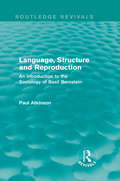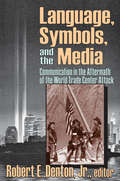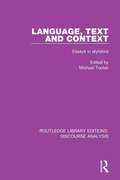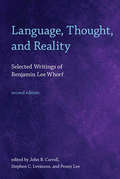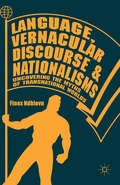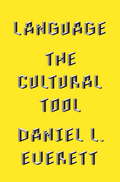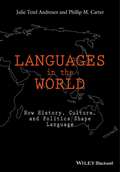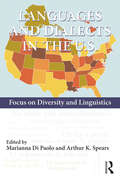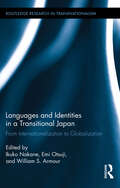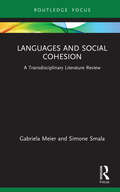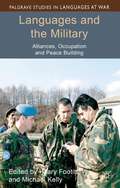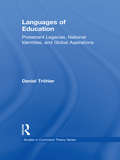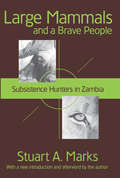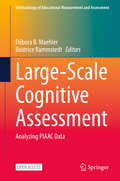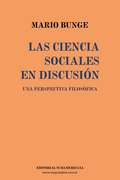- Table View
- List View
Language, Structure and Reproduction: An Introduction to the Sociology of Basil Bernstein (Routledge Revivals)
by Paul AtkinsonBasil Bernstein is one of the most creative and influential of contemporary British sociologists, yet his work – especially that relating to language and social structure – is widely misunderstood and misrepresented. This book, first published in 1985, addresses the underlying themes and continuities in Bernstein’s work and portrays him as a sociologist in the Durkheimian tradition. This reissue will be of particular value to students interested in the sociology of education, language and society, anthropological linguistics and communication studies.
Language, Symbols, and the Media: Communication in the Aftermath of the World Trade Center Attack
by Robert E., DentonThe terrorist attacks of September 11, 2001 created a new political landscape and a new era of warfare. Language, Symbols, and the Media, now in paperback, offers insights into the impact and influence of 9/11 upon our cultural, social, and political life. The book opens with an introductory chapter on communications, media language, and visual symbolism in the immediate wake of the attacks. The second chapter considers the challenge to religious pluralism, analyzing the grounds for the immediate backlash against Islam. Chapter 3 reviews several crucial historical and contemporary Supreme Court rulings relevant to the limitations of free speech in times of war and national crises. The consideration of First Amendment rights is continued in chapter 4, which places the Patriot Act in historical context by comparing the legislation and its interpretation of it to other legislation passed in response to past American crises. The immediate aftermath of the attacks witnessed many calls for an end to "the age of irony" and a return to "traditional values." Chapter 5 considers some contrarian responses and analyzes the impact of irony as a rhetorical device in American culture. The unifying role of sport in the post-9/11 healing process in America is examined in chapter 6. Chapter 7 examines the reactions and responses of young adults to the events of 9/11 one year later. Chapter 8 demonstrates how politicians received a public "makeover" of their careers. Chapter 9 explores the impact of 9/11 on the rhetoric of advertising, while chapter 10 focuses more closely on how it affected the tourism industry. A concluding chapter examines several instances of media self-censorship and its implications for the policymaking process during times of crisis. This volume will be of interest to cultural studies specialists, sociologists, journalists, political scientists, historians, as well as general readers.
Language, Text and Context: Essays in stylistics (RLE: Discourse Analysis)
by Michael ToolanFirst published in 1992, this wide-ranging collection of essays focuses on the principle of contextualisation as it applies to the interpretation, description, theorising and reading of literary and non-literary texts. The collection aims to reveal the interdependencies between theory, analysis, text and context by challenging the myth that stylistics entails a fundamental separation of text from context, linguistic description from descriptive interpretation, or language from situation. The essays cover a historically diverse set of texts, from Puttenham to Colemanballs, and a number of language-sensitive topics such as post-modernism, irony, newspaper representations, gender and narrative.
Language, Thought, and Reality
by Stephen C. Levinson Penny Lee Benjamin Lee Whorf John B. CarrollThe pioneering linguist Benjamin Whorf (1897--1941) grasped the relationship between human language and human thinking: how language can shape our innermost thoughts. His basic thesis is that our perception of the world and our ways of thinking about it are deeply influenced by the structure of the languages we speak. The writings collected in this volume include important papers on the Maya, Hopi, and Shawnee languages, as well as more general reflections on language and meaning. Whorf's ideas about the relation of language and thought have always appealed to a wide audience, but their reception in expert circles has alternated between dismissal and applause. Recently the language sciences have headed in directions that give Whorf's thinking a renewed relevance. Hence this new edition of Whorf's classic work is especially timely.The second edition includes all the writings from the first edition as well as John Carroll's original introduction, a new foreword by Stephen Levinson of the Max Planck Institute for Psycholinguistics that puts Whorf's work in historical and contemporary context, and new indexes. In addition, this edition offers Whorf's "Yale Report," an important work from Whorf's mature oeuvre.
Language, Thought, and Reality, second edition: Selected Writings of Benjamin Lee Whorf
by Benjamin Lee WhorfWritings by a pioneering linguist, including his famous work on the Hopi language, general reflections on language and meaning, and the "Yale Report."The pioneering linguist Benjamin Whorf (1897–1941) grasped the relationship between human language and human thinking: how language can shape our innermost thoughts. His basic thesis is that our perception of the world and our ways of thinking about it are deeply influenced by the structure of the languages we speak. The writings collected in this volume include important papers on the Maya, Hopi, and Shawnee languages, as well as more general reflections on language and meaning.Whorf's ideas about the relation of language and thought have always appealed to a wide audience, but their reception in expert circles has alternated between dismissal and applause. Recently the language sciences have headed in directions that give Whorf's thinking a renewed relevance. Hence this new edition of Whorf's classic work is especially timely.The second edition includes all the writings from the first edition as well as John Carroll's original introduction, a new foreword by Stephen Levinson of the Max Planck Institute for Psycholinguistics that puts Whorf's work in historical and contemporary context, and new indexes. In addition, this edition offers Whorf's "Yale Report," an important work from Whorf's mature oeuvre.
Language, Vernacular Discourse and Nationalisms: Uncovering The Myths Of Transnational Worlds
by Finex NdhlovuThis book examines the linguistic and discursive elements of social and economic policies and national political leader statements to read new meanings into debates on border protection, national sovereignty, immigration, economic indigenisation, land reform and black economic empowerment. It adds a fresh angle to the debate on nationalisms and transnationalism by pushing forward a more applied agenda to establish a clear and empirically-based illustration of the contradictions in current policy frameworks around the world and the debates they invite. The author’s novel vernacular discourse approach contributes new points of method and interpretation that will advance scholarly conversations on nationalisms, transnationalism and other forms of identity imaginings in a transient world.
Language, Youth and Identity in the 21st Century
by Jacomine Nortier Bente A. SvendsenThe language of young people is central in sociolinguistic research, as it is seen to be innovative and a primary source of knowledge about linguistic change and the role of language. This volume brings together a team of leading scholars to explore and compare linguistic practices of young people in multilingual urban spaces, with analyses ranging from grammar to ideology. It includes fascinating examples from cities in Europe, Africa, Canada and the US to demonstrate how young people express their identities through language, for example in hip-hop lyrics and new social media. This is the first book to cover the topic from a globally diverse perspective, and it investigates how linguistic practices across different communities intersect with age, ethnicity, gender and class. In doing so it shows commonalities and differences in how young people experience, act and relate to the contemporary social, cultural and linguistic complexity of the twenty-first century.
Language: The Cultural Tool
by Daniel L. EverettA bold and provocative study that presents language not as an innate component of the brain--as most linguists do--but as an essential tool unique to each culture worldwide. For years, the prevailing opinion among academics has been that language is embedded in our genes, existing as an innate and instinctual part of us. But linguist Daniel Everett argues that, like other tools, language was invented by humans and can be reinvented or lost. He shows how the evolution of different language forms--that is, different grammar--reflects how language is influenced by human societies and experiences, and how it expresses their great variety. For example, the Amazonian Pirahã put words together in ways that violate our long-held under-standing of how language works, and Pirahã grammar expresses complex ideas very differently than English grammar does. Drawing on the Wari' language of Brazil, Everett explains that speakers of all languages, in constructing their stories, omit things that all members of the culture understand. In addition, Everett discusses how some cultures can get by without words for numbers or counting, without verbs for "to say" or "to give," illustrating how the very nature of what's important in a language is culturally determined. Combining anthropology, primatology, computer science, philosophy, linguistics, psychology, and his own pioneering--and adventurous--research with the Amazonian Pirahã, and using insights from many different languages and cultures, Everett gives us an unprecedented elucidation of this society-defined nature of language. In doing so, he also gives us a new understanding of how we think and who we are.
Languages In The World: How History, Culture, And Politics Shape Language (First Edition)
by Julie Tetel Andresen Phillip M. CarterThis innovative introduction outlines the structure and distribution of the world's languages, charting their evolution over the past 200,000 years. Balances linguistic analysis with socio-historical and political context, offering a cohesive picture of the relationship between language and society Provides an interdisciplinary introduction to the study of language by drawing not only on the diverse fields of linguistics (structural, linguist anthropology, historical, sociolinguistics), but also on history, biology, genetics, sociology, and more Includes nine detailed language profiles on Kurdish, Arabic, Tibetan, Hawaiian, Vietnamese, Tamil, !X#65533;#65533; (Taa), Mongolian, and Quich#65533; A companion website offers a host of supplementary materials including, sound files, further exercises, and detailed introductory information for students new to linguistics
Languages and Dialects in the U.S.: Focus on Diversity and Linguistics
by Marianna Di Paolo Arthur K. SpearsLanguages and Dialects in the U.S. is a concise introduction to linguistic diversity in the U.S. for students with little to no background in linguistics. The goal of the editors of this collection of fourteen chapters, written by leading experts on the language varieties discussed, is to offer students detailed insight into the languages they speak or hear around them, grounded in comprehensive coverage of the linguistic systems underpinning them. The book begins with "setting the stage" chapters, introducing the sociocultural context of the languages and dialects featured in the book. The remaining chapters are each devoted to particular U.S. dialects and varieties of American English, each with problem sets and suggested further readings to reinforce basic concepts and new linguistic terminology and to encourage further study of the languages and dialects covered. By presenting students with both the linguistic and social, cultural, and political foundations of these particular dialects and variations of English, Languages and Dialects in the U.S. is the ideal text for students interested in linguistic diversity in the U.S., in introductory courses in sociolinguistics, language and culture, and language variation and change.
Languages and Identities in a Transitional Japan: From Internationalization to Globalization (Routledge Research in Transnationalism)
by Ikuko Nakane Emi Otsuji William S. ArmourThis book explores the transition from the era of internationalization into the era of globalization of Japan by focusing on language and identity as its central themes. By taking an interdisciplinary approach covering education, cultural studies, linguistics and policy-making, the chapters in this book raise certain questions of what constitutes contemporary Japanese culture, Japanese identity and multilingualism and what they mean to local people, including those who do not reside in Japan but are engaged with Japan in some way within the global community. Topics include the role of technology in the spread of Japanese language and culture, hybrid language use in an urban context, the Japanese language as a lingua franca in China, and the identity construction of heritage Japanese language speakers in Australia. The authors do not limit themselves to examining only the Japanese language or the Japanese national/cultural identity, but also explore multilingual practices and multiple/fluid identities in "a transitional Japan." Overall, the book responds to the basic need for better accounts of language and identity of Japan, particularly in the context of increased migration and mobility.
Languages and Social Cohesion: A Transdisciplinary Literature Review (Routledge Advances in Sociology)
by Gabriela Meier Simone SmalaA critical and systematic review of existing research located at the crossroads of sociology, social psychology and applied linguistics, Languages and Social Cohesion offers valuable insights for social contexts in which decision makers and researchers grapple with questions of social cohesion in the presence of linguistic diversity. Based on a thematic analysis of 285 studies from 50 countries (references available) this book emphasises the crucial role languages play in understanding social cohesion, and provides a framework of perspectives to aid exploration of these complex interlinkages. Through interpreting the literature, the authors established language repertoires as tools that facilitate social networks and access to resources. Furthermore, language norms and allegiances can subjectively shape the way groups use their language resources, which can result in social inclusion, exclusion and mediation between language groups. Education particularly is highlighted as a policy tool that implements linguistic decisions and norms, and steers status, hierarchies and distribution of languages in society. The theory-informed and accessible tools featured can be used to guide and inform further research, workshops or projects that investigate social cohesion and languages. This book is relevant for diverse and intersecting spheres of influence, such as groups, communities, institutions and authorities at local, regional, national and international levels.
Languages and the Military
by Michael Kelly Hilary FootittThrough detailed case studies ranging from the 18th century until today,this book explores the role of foreign languages in military alliances, in occupation and in peace building. It brings together academic researchers and practitioners from the museum and interpreting worlds and the military.
Languages at War
by Michael Kelly Hilary FootittThrough detailed case studies ranging from the 18th century until today,this book explores the role of foreign languages in military alliances, in occupation and in peace building. It brings together academic researchers and practitioners from the museum and interpreting worlds and the military.
Languages of Belief and Early Sociology in Nineteenth-Century France: The Elementary Forms of Sociological Life
by Michiel Van DamThis book presents a new reading of the history of French social science and religion through an investigation of early sociology’s techniques for narrating the category of belief. The author argues that by looking at the history of social sciences in this manner, we gain a deeper understanding of both our present debates on post-secularity as well as our modernist past, both of which were thoroughly shaped by their reflections and critiques on the notion of belief yet failed to enter into any sort of meaningful communication with each other. This book seeks to rectify this failure by introducing the concept of ‘belief-languages’, an anthropological framework designed to historicize different discussions on belief and allow for their comparative description and analysis.
Languages of Education: Protestant Legacies, National Identities, and Global Aspirations (Studies in Curriculum Theory Series)
by Daniel TröhlerIn this landmark contribution to the study of the formation of the modern school, Daniel Tröhler applies one of the most recognized methods of historical research to an analysis of the "language" of the academic discipline of education. Arguing the value of looking at languages rather than arguments--langues rather than paroles--this method of historical research is used to examine the background of different philosophies, theories, or arguments of education, specifically republicanism and Protestantism. Tröhler’s argument is that such analysis is essential to tracing back educational arguments to the ideological core of their concerns, and thus to understanding in international perspective the historical development of education systems and organizations and to evaluating their different theoretical and political approaches and claims. Elegantly written, with the historian’s attention to archival material, this book enables the reader to understand the complex and different social, cultural, religious, and political context factors embedded in the "thought" of schooling and its objects of scrutiny--its notions of the child and teacher. Languages of Education is essential reading for scholars and students across the fields of history and philosophy of education, curriculum studies, and comparative education.
Languages other than English in Australian Higher Education: Policies, Provision, and the National Interest (Language Policy #17)
by Jennifer Joan BaldwinThis book researches the study of languages other than English, and their place in the Australian tertiary sector. Languages are discussed in the context of the histories of Australian universities, and the series of reports and surveys about languages across the second half of the twentieth century. It demonstrates how changes in the ethnic mix of society are reflected in language offerings, and how policies on languages have changed as a result of societal influences. Also discussed is the extent to which influencing factors changed over time depending on social, cultural, political and economic contexts, and the extent to which governments prioritised the promotion and funding of languages because of their perceived contribution to the national interest.The book will give readers an understanding as to whether languages have mattered to Australia in a national and international sense and how Australia’s attention to languages has been reflected in its identity and its sense of place in the world.
Laparoscopic Hernia Repair
by Michael S KavicLaparoscopy is increasingly being used as an alternative to more invasive surgical techniques. This book details newly revealed anatomical dynamics of the lower abdominal wall and introduces the reader to laparoscopic repair of the inguinal hernia.
Large Mammals and a Brave People: Subsistence Hunters in Zambia
by Stuart A. MarksThe Valley Bisa people inhabit the Luangwa Valley in central Zambia. Among them, the hunter, who tracks such large game as the lion, elephant, and buffalo, commands great respect and esteem from the other members of the lineage who traditionally rely on him for their subsistence and protection. Although the social organization and technology of the Bisa people have undergone tremendous change in the last one hundred years, the role of hunter retains its social importance, and the legitimizing hunting rituals have their roots in local history. Drawing on data collected during his fieldwork among the Bisa continuing since the 1960s, Stuart Marks describes the changes that have occurred in hunting patterns, the sociological variables that govern an individual's decision to become a hunter, and the common cosmological convictions that hunters bring to their profession. Available for the first time in paperback, the new introduction and afterword to this edition reflect on methodological and ideological changes in the anthropological study of African peoples as well as updating the circumstances of the Bisa people since the book's first appearance in 1976. Through the interventions of the larger national society the Bisa have lost much of their land and access to important portions of their resources while experiencing repression in their struggles to maintain livelihoods with what local assets are left. Nevertheless, Marks notes that they face their hardships with tolerance, integrity, persistence, and humility. The general reader, as well as prehistorians and anthropologists concerned with human evolution and hunting societies, will find this volume useful. It will also be of interest to wildlife managers and ecologists.
Large-Scale Cognitive Assessment: Analyzing PIAAC Data (Methodology of Educational Measurement and Assessment)
by Débora B. Maehler Beatrice RammstedtThis open access methodological book summarises existing analysing techniques using data from PIAAC, a study initiated by the OECD that assesses key cognitive and occupational skills of the adult population in more than 40 countries. The approximately 65 PIAAC datasets that has been published worldwide to date has been widely received and used by an interdisciplinary research community. Due to the complex structure of the data, analyses with PIAAC datasets are very challenging. To ensure the quality and significance of these data analyses, it is necessary to instruct users in the correct handling of the data. This methodological book provides a standardised approach to successfully implementing these data analyses. It contains examples of and tools for the analysis of the PIAAC data using different statistical approaches and software, and it offers perspectives from various disciplines. The contributing authors have hands-on experience of using PIAAC data, and/or they have conducted data analysis workshops with these data.
Las Ciencias Sociales en discusion
by Mario BungeLas ciencias sociales en discusión es el nuevo libro de Mario Bunge, elautor de la monumental obra Treatise on Basic Philosophy, conocidoampliamente como el filosofo de las ciencias. En este volumen centra suatención en las ciencias y tecnologías sociales, considera numerosasdisciplinas que incluyen: antropología, sociología, economía, cienciapolítica,derecho, historia y ciencias de la administración. Las ciencias sociales en discusión es el nuevo libro de Mario Bunge, elautor de la monumental obra Treatise on Basic Philosophy, conocidoampliamente como el filosofo de las ciencias. En este volumen centra suatención en las ciencias y tecnologías sociales, considera numerosasdisciplinas que incluyen: antropología, sociología, economía, cienciapolítica,derecho, historia y ciencias de la administración.Bunge sostiene que la investigación en ciencias sociales estaactualmente sujeta a la fascinación posmoderna por el irracionalismo yel relativismo. Les propone a los científicos sociales reexaminar lafilosofía y la metodología que esta en la base de sus propiasdisciplinas. Aboga por la objetividad, las teorizaciones rigurosas, lascomprobaciones empíricas así como por un diseño de políticasmoderadamente sensibles y socialmente responsables."El merito mayor de esta obra reside en su amplio espectro de contenidosrelevantes y en su estructura inteligente, confiable y clara. De estevolumen se aprende muchísimo, puede ser utilizado como columna vertebralde un curso o por una persona inteligente que desee iniciarse encualquiera de las disciplinas que trata. Reitero: calidad y erudiciónson susprincipales meritos."Esrnest A. Gellner, filosofo contemporáneo, Central European University.
Las escuelas que cambian el mundo
by César BonaEl nuevo libro de César Bona nos invita a conocer de primera mano algunos de los casos maravillosos que están teniendo lugar en el ámbito educativo español, excelentes ejemplos de que la educación de nuestros hijos, la forma de enseñarles, puede hacerse de otra manera y, lo mejor de todo: funciona. Hay escuelas en España que están cambiando la educación. Escuelas que no están en Finlandia ni en Suecia; unas son públicas, otras rurales y algunas incluso están masificadas. Todas ellas son «Escuelas Changemaker» y están preparadas para liderar una verdadera transformación educativa. César Bona ha viajado por siete ciudades y pueblos siguiendo el camino de algunas de las escuelas que están luchando para que cada niño, niña y joven tenga la oportunidad de convertirse en un agente de cambio. Son lugares que cuentan con alumnos motivados, maestros corrientes, y padres cómplices detrás. Escuelas excelentes académicamente y conun proyecto integral donde el respeto, la creatividad, la imaginación, el trabajo en equipo, la empatía y la interacción con la sociedad son el mejor camino para completar las enseñanzas de las asignaturas tradicionales. César Bona nos narra, con su personal y cercana voz, lo que han logrado estas escuelas, lo novedoso de sus métodos y cómo todos, sea cual sea nuestra edad, podemos cambiar el mundo. No olvidemos que los niños no son los adultos del mañana, son los niños del presente y ellos, si les dejamos ser niños, si les reforzamos su creatividad natural, su imaginación desbordante y trabajamos la empatía, la solidaridad y el respeto, pueden cambiar el mundo. No en el futuro, sino ahora. Porque una nueva educación no es un sueño, es una realidad.
Las folias del sexo: Ideas y creencias sobre el sistema genital
by Francisco González Crussí«Uno de los mejores escritores médicos de nuestros días.» Booklist «Pocos médicos tienen la fortuna y capacidad de escribir por medio de las lentes del microscopio: vida, dolor, enfermedad, amor y muerte se amplifican, siembran, preguntan. Francisco González Crussí ha tejido numerosos textos Notas de un anatomista, La enfermedad del amor, El rostro y el alma recargándose en sus habilidades como patólogo y en su disección de la(s) vida(s). Sus libros son un dechado de conocimiento. Las folías del sexo no es la excepción. »Folía, explica González Crussí, implica locura y canto; chifladura y baile. De mil formas, gracias a dibujos anatómicos, retratos, xilografías, fuentes, notas, y sobre todo con una virtud escritural que desglosa y expone con elegancia las folías del sexo, el libro depara un ameno paseo aderezado con inmensas dosis de sabiduría e información. Amor, enfermedad y sexo son etiquetas universales, imperecederas. Vivimos y fenecemos con ellas. Francisco explica algunos porqués. El lector encontrará sus porqués en las páginas del libro.» Arnoldo Kraus, médico y escritor «González Crussí sabe demasiado y lo comparte sin jactancia. Sus ensayos combinan datos duros con especulación y severidad con humor; están colmados de sorprendentes anécdotas y son refinados en su lenguaje.» The New York Times Book Review
Las leyes naturales del niño
by Céline AlvarezCéline Alvarez propone en este libro un nuevo sistema educativo que ya ha empezado a provocar un cambio pedagógico en Francia. Basado en los principios de la metodología Montessori y en los avances de la neurociencia, demuestra que el niño tiene unas capacidades innatas para aprender, solo hay que proporcionarle los estímulos y el ambiente adecuados y respetar sus leyes naturales. Todos los niños nacen con una capacidad innata para aprender y amar. Día tras día, la neurociencia nos descubre más sobre su increíble potencial. Sin embargo, por desinformación, les imponemos un sistema educativo inadecuado que entorpece su aprendizaje y no fomenta su bondad intrínseca. En Francia, más del 40% de los niños acaban la educación primaria sin haber cumplido con los objetivos de aprendizaje. En el caso de España la situación es todavía peor, pues tiene las tasas de fracaso y abandono escolar más altas de Europa: el 20% de los jóvenes no terminan sus estudios de secundaria. Céline Alvarez llevó a cabo un experimento en un parvulario en Gennevilliers, un municipio situado al noroeste de París y una zona con grandes desigualdades sociales y económicas. En este experimento, respetó las «leyes naturales del niño» y los resultados han sido excepcionales. En dos cursos, todos los niños del curso superior y el 90% del curso inferior sabían leer y mostraron excelentes resultados en aritmética. Y no solo eso, en casa estaban más tranquilos, mantenían sus habitaciones más ordenadas y mostraban mayor interés por cuanto los rodeaba. Increíble, pero cierto. Este libro sienta las bases de una nueva manera de ver al niño, y de concebir la educación tanto en casa como en la escuela. Céline Alvarez nos enseña su experiencia y nos invita a educar al niño respetando sus leyes naturales. La revolución de la educación es posible.
Las leyes naturales del niño: La revolución de la educación en la escuela y en casa
by Céline AlvarezCéline Alvarez propone en este libro un nuevo sistema educativo que ya ha empezado a provocar un cambio pedagógico en Francia. Basado en los principios de la metodología Montessori y en los avances de la neurociencia, demuestra que el niño tiene unas capacidades innatas para aprender, solo hay que proporcionarle los estímulos y el ambiente adecuados y respetar sus leyes naturales. Todos los niños nacen con una capacidad innata para aprender y amar. Día tras día, la neurociencia nos descubre más sobre su increíble potencial. Sin embargo, por desinformación, les imponemos un sistema educativo inadecuado que entorpece su aprendizaje y no fomenta su bondad intrínseca. En Francia, más del 40% de los niños acaban la educación primaria sin haber cumplido con los objetivos de aprendizaje. En el caso de España la situación es todavía peor, pues tiene las tasas de fracaso y abandono escolar más altas de Europa: el 20% de los jóvenes no terminan sus estudios de secundaria.Céline Alvarez llevó a cabo un experimento en un parvulario en Gennevilliers, un municipio situado al noroeste de París y una zona con grandes desigualdades sociales y económicas. En este experimento, respetó las «leyes naturales del niño» y los resultados han sido excepcionales. En dos cursos, todos los niños del curso superior y el 90% del curso inferior sabían leer y mostraron excelentes resultados en aritmética. Y no solo eso, en casa estaban más tranquilos, mantenían sus habitaciones más ordenadas y mostraban mayor interés por cuanto los rodeaba. Increíble, pero cierto. Este libro sienta las bases de una nueva manera de ver al niño, y de concebir la educación tanto en casa como en la escuela. Céline Alvarez nos enseña su experiencia y nos invita a educar al niño respetando sus leyes naturales. La revolución de la educación es posible.
